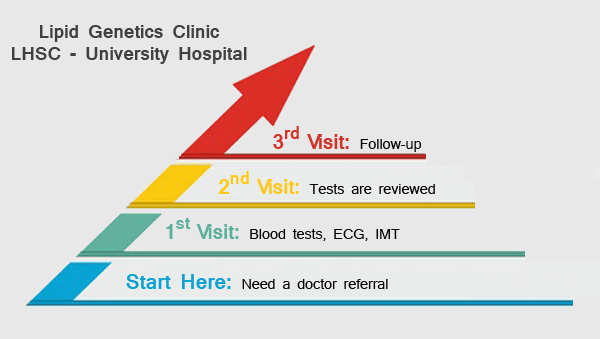About the Clinic
Dr. Hegele is a specialist who has a special interest and expertise in providing health care to patients whose blood lipids - such as cholesterol and triglycerides - are out of balance. As an endocrinologist, Dr. Hegele also provides health care to patients with diabetes and other metabolic problems that sometimes occur together with lipid disorders. Dr. Hegele has over 1200 patients under his care. |
 |
Dr. Hegele conducts clinical trials of new medications that may not yet be available for prescription. He also directs a research laboratory, and his team has discovered the genetic basis of many different lipid disorders, inherited forms of diabetes and other rare conditions. His research accomplishments have been recognized by awards from societies such as the American Heart Association, the Canadian Diabetes Association and the Heart and Stroke Foundation of Canada. Dr. Hegele is also a Distinguished Professor of Medicine and Biochemistry in the Schulich School of Medicine, University of Western Ontario.
|
Why are you here?
You have been referred to Dr. Hegele by your family doctor because he or she has concerns about your cholesterol or triglycerides, called lipids or fats that are in your blood. These lipids need to be in balance for your arteries and heart to be healthy. Dr. Hegele will carefully consider your health history and assess your cholesterol levels to determine the best course of treatment for your individual issue.
What tests are performed on the first visit?
Several blood tests, ECG, and IMT are routinely performed on your first visit to the Lipid Genetics Clinic. The results will be discussed with you at your second visit. These tests are shown in the table below:
**Below is a list of tests of the services we offer and a description of each, if any questions arise or you would like to learn more about the tests feel free to visit our Frequently Asked Questions page or contact us to further answer any questions you may have.**
| Test name | Why is it done? |
| * Lipid profile: total cholesterol, LDL and HDL cholesterol and triglycerides [* This test is done after a 12-14 hour fasting period because our standards are determined from fasting levels] |
|
| TSH (thyroid test) |
|
| AST (aspartate transaminases), ALT (alanine transaminases), ALP (alkaline phosphatase) |
|
| Urinalysis (for sugar and protein) |
|
| Glucose (blood sugar) |
|
| HbA1C (glycated haemoglobin) |
|
| Urea, creatinine |
|
| CK (creatine kinase) |
|
| ESR (erythrocyte sedimentation rate) |
|
| Serum electrolytes |
|
| Serum insulin |
|
| Risk Factors: | |
| Apolipoprotein A1 |
|
| Apolipoprotein B |
|
| Fibrinogen |
|
| Lp(a) |
|
| CRP (C-reactive protein) |
|
| DNA analysis |
|
| Carotid ultrasound |
|
| DNA testing |
|

